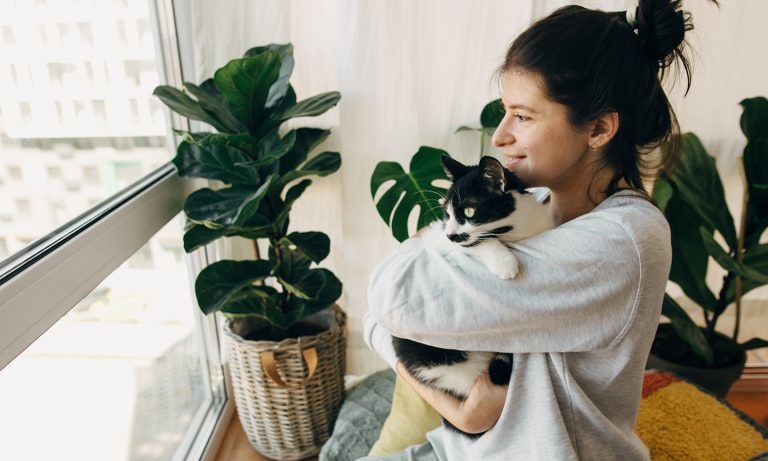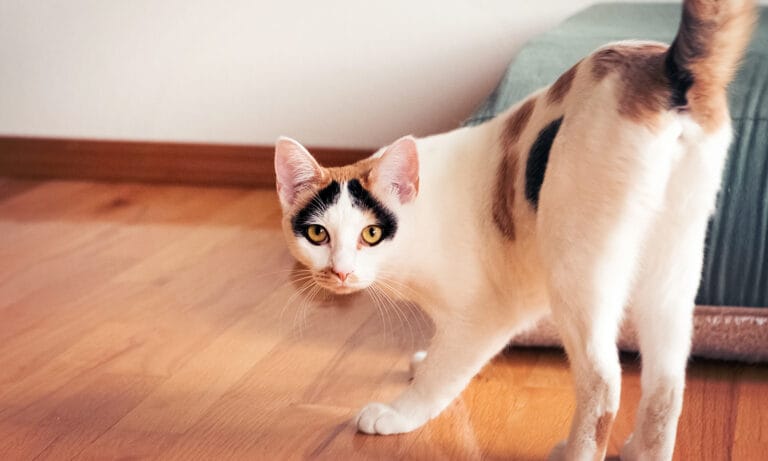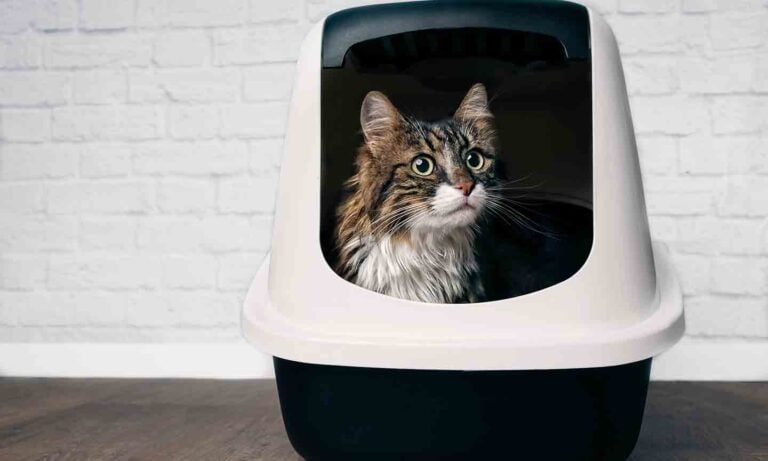Cats are notorious for trying to hide when they don’t feel well. But just like humans, they can experience tummy troubles from time to time. An upset stomach in cats can have multiple causes, from eating a new food to something more serious, like an underlying illness or disease.
If you notice your cat is acting a little off, there are some things you can do at home to soothe their stomach and make them feel better. But, if you suspect there’s something more serious going on with your cat’s health, you’ll want to take them to the vet for a full check-up.
In This Guide:
Signs Your Cat Has an Upset Stomach
Signs of tummy upset in a cat can vary depending on the cause, says Monica Tarantino, DVM, founder of Vets on the Rise and Senior Dog Revolution in Alexandria, Virginia.
However, the most common signs your cat has an upset stomach usually include:
Causes of an Upset Stomach in Cats
And just as the signs can vary, so can the causes. An upset stomach is pretty non-specific, meaning it could arise from something as simple as eating a new food or be a symptom of a potentially life-threatening situation, like eating a toxic plant.
The most common causes of upset stomach in cats include:
Food Indiscretion (Eating Something They Don’t Normally Eat)
Some cats have a sensitive stomach. Changing their diet too quickly or giving them food or treats they don’t normally eat can upset their digestive system and cause stomach trouble.
This can also happen if you feed them human food toxic to cats, or difficult for them to digest.
Eating Things They’re Not Supposed To
In a similar vein, cats are known for being curious creatures, and sometimes that means they get into something they shouldn’t.
An upset stomach can be a result of a blockage from ingesting a foreign object, like a string. Dental floss, ribbon, hair ties and yarn are common culprits, according to Dr. Tarantino. It can also be a result of eating a toxic plant, like lilies. Eating any part of lilies, even the pollen, from true lilies in the Lilium species, or daylilies in the Hemerocallis species, is a life-threatening medical emergency that can result in kidney failure if not treated promptly.
Stress
Stress can also cause an upset stomach in cats, according to Alison Birken, DVM, owner of Victoria Park Animal Hospital in Fort Lauderdale, Florida.
Just like with humans, excessive stress in cats can cause indigestion, vomiting, diarrhea, and constipation.
If stress is the cause, your cat may also seem tense and withdrawn and be more reactive to their environment.
Intestinal Parasites
Intestinal parasites, also known as worms, can affect cats of all ages, but they’re especially common in kittens who haven’t been wormed yet, says Dr. Tarantino.
If you suspect parasites in your cat or kitten, seek veterinary care ASAP. If left untreated, parasites (and the diarrhea that often come with them) can make cats and kittens sick very quickly.
Food Allergies or Sensitivities
Just like humans, cats can develop allergies or sensitivities to certain foods and proteins. The most common food allergens for cats include beef, chicken, fish, and dairy.
While food allergies can certainly trigger an upset stomach, the most common reaction is constant itching and licking that doesn’t seem to wane with the seasons.
Underlying Health Issues
Some health issues can also cause an upset stomach. Typically, these more serious conditions are accompanied by other symptoms, like vomiting, weight loss, coat changes, and lethargy, among others.
Some of the most common underlying conditions causing stomach upset in cats include:
- Inflammatory bowel disease (IBD)
- Gastroenteritis
- Hyperthyroidism
- Kidney disease
- Liver disease
- Pancreatitis
- Cancer
- Diabetes
Hairballs
Coughing up an occasional hairball can be normal behavior in cats, and Dr. Birken says you don’t need to be overly concerned with this. However, if your cat is having a difficult time coughing up a hairball, or frequently throws up hairballs, that can be a sign of underlying disease.
If you are concerned, you should talk to your veterinarian. They may prescribe a supplement or transition them to a diet formulated to help with hairballs. You can also brush or comb your cat more frequently to decrease the amount of hair they ingest while grooming.
When Your Cat Should See a Veterinarian
So, when should you be concerned that your cat may have an underlying health issue? The best way to answer this question is to start by asking how often your cat is experiencing an upset stomach and if your cat has any other symptoms, says Dr. Birken.
Most of the time, symptoms like diarrhea and vomiting resolve within a few days, and an occasional episode here and there usually isn’t anything more serious. However, if your kitty is having severe diarrhea for longer than 24 hours, there is vomiting, and/or if they have other symptoms (lethargy, not eating or decreased appetite, withdrawal, etc.), it’s best to contact your veterinarian immediately.
Clinical signs you should look for that require more advanced testing include the following, according to Dr. Birken:
- Multiple episodes of vomiting and diarrhea in a month
- Weight loss
- Loss of appetite and refusing food
- Chronic soft stool
- Inability to keep food down due to vomiting
- Lethargy
- Hiding
- Showing signs of pain and discomfort
- Multiple episodes of vomiting throughout the day despite having no food or water in their stomach
These clinical signs can be associated with more serious digestive health conditions such as foreign bodies, pancreatitis, inflammatory bowel disease, or even cancer, according to Dr. Birken.
So, if your cat is exhibiting any of the above symptoms, your vet will likely order additional diagnostics, such as blood tests, radiographs, X-rays, and possibly an ultrasound to test for more serious diseases.
If you have any concerns whatsoever, please take your cat to the vet.
What To Feed a Cat With an Upset Stomach
Most vets recommend feeding your cat a bland diet—that may mean plain, unseasoned boiled chicken and rice or a small amount of pumpkin—while they have an upset stomach. Never use canned pumpkin pie filling, which often includes seasonings like nutmeg, as it is toxic to cats.
The bland food helps settle their digestive tract, while the pumpkin (or pumpkin-based treats, like Nummy Tum-Tum™) contain fiber that can help bulk up the stool.
Talk to your vet before changing your cat’s food or offering foods like pumpkin.
Home Remedies for Cat Upset Stomach
In addition to feeding your cat a bland diet, there are some other steps you can take at home to try to settle their tummy.
Before trying these home remedies, you should give your vet a call to rule out any serious concerns. If your vet doesn’t think you need to bring your kitty in for a check-up, discuss the options below to get the all-clear.
If your vet approves, you can:
- Give them probiotics labeled for cats. Sometimes an imbalanced microbiome can cause digestive upset, and probiotics can help balance the gut, especially if an upset stomach is caused by changing the diet too quickly. Purina® Pro Plan® FortiFlora® is not only formulated for cats, but it’s also a powder that can be sprinkled or mixed with food, and it’s palatable to most cats.
- Try hairball remedy supplements, if needed. If your cat occasionally coughs up a hairball, you may want to try an over-the-counter option like Tomlyn® Hairball Remedy, which helps eliminate and prevent hairballs.
- Feed them a diet that is formulated for sensitive tummies, like Hill’s Prescription Diet® i/d® Digestive Care Cat Food. While certain diet foods require an authorization from your vet, these diets are easier to digest and frequently have prebiotics and fatty acids, which are beneficial for digestive and immune health.
How To Prevent Upset Stomach in Cats
As they say, an ounce of prevention is worth a pound of cure. In other words, it’s often easier to prevent an upset stomach than it is to make your cat feel better once they have tummy troubles.
Of course, you’re not going to be able to guarantee that your cat feels good all the time, but there are some things you can do to make an upset stomach less likely.
- Do not feed your cat foods that they do not regularly eat—even new treats purchased over the counter can cause diarrhea in cats.
- When introducing new food, switch it slowly over two weeks. Add a little bit of the new food to the old food gradually, slowly transitioning to a higher ratio of the new food.
- Make sure your cat is on a monthly heartworm prevention that protects against intestinal parasites. Have your cat tested every six months to a year for parasites. Learn more about heartworms in cats.
- Keep toxic plants out of your home. Dr. Tarantino says she always tells cat parents to be compulsive about keeping potentially harmful plants and flowers out of the home. Cats love to nibble on plants, but some plants, like lilies, can be potentially lethal, while others can irritate the digestive tract. Be diligent about researching plants and very discerning about what’s allowed in your home.
- Be cautious with strings and ribbons. Dr. Tarantino says that this is another thing she often warns cat parents about. String can easily become a foreign body and is one of the most common found in felines. This may not only lead to digestive upset, it can also become life-threatening. Avoid leaving ribbons, string toys, floss, hair ties, and yarn around the house.
- Don’t skip routine visits. Bring your kitty to the vet yearly to get screened for diseases and parasites. Even if your cat looks healthy on the outside, this can help ensure there’s nothing going on beneath the surface.
There are many potential reasons your cat may have an upset stomach, and because they can’t tell you what’s wrong, you may have to go through a process of elimination to figure out the underlying cause. Hairballs occur occasionally in cats, especially long-haired ones, so if you’ve ruled out this cause and notice your cat is still exhibiting signs of tummy troubles, such as vomiting, diarrhea, decreased appetite, and/or drooling, it’s best to reach out to your vet to figure out what’s going on and the best course of treatment.
Expert input provided by Alison Birken, owner and DVM of Victoria Park Animal Hospital in Fort Lauderdale, Florida; and Monica Tarantino, DVM, founder of Vets on the Rise and Senior Dog Revolution in Alexandria, Virginia.
This content was medically reviewed by Chewy vets.
More on caring for cats:
Share:














